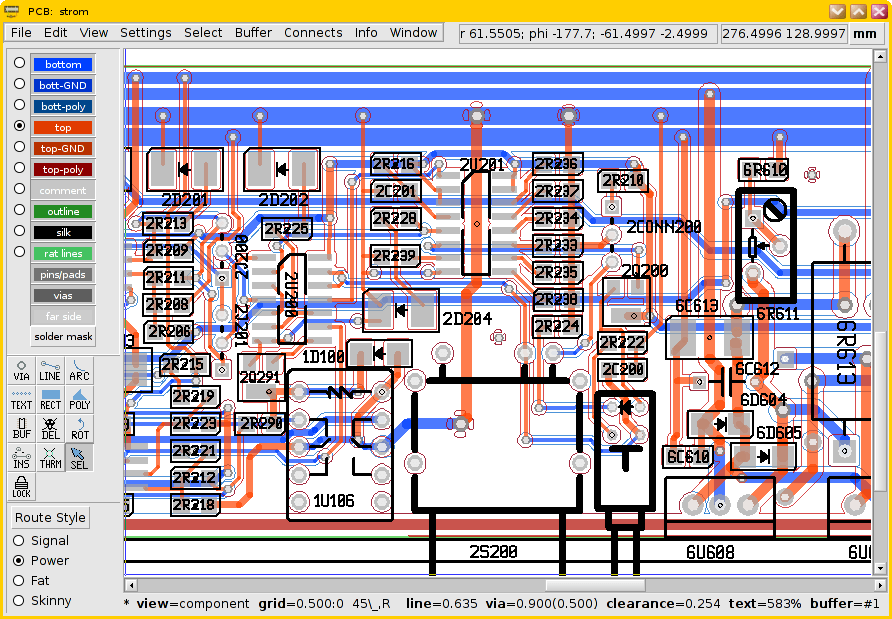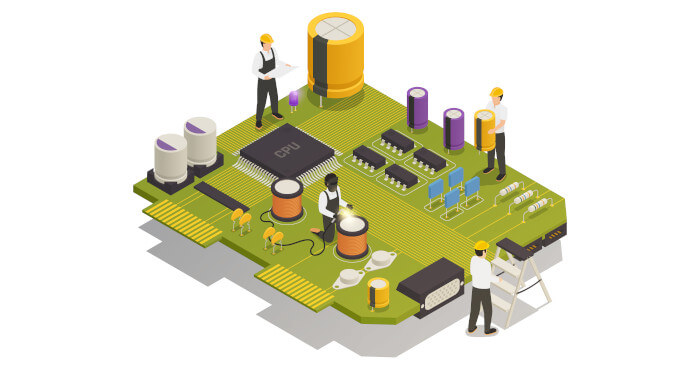The gEDA project has produced and continues with the development of a comprehensive open source suite and toolkit of Electronic Design Automation tools.
These tools are used for electrical circuit design, schematic capture, simulation, prototyping, and production. Currently, the gEDA project offers a mature suite of free software applications for electronics design, including schematic capture, attribute management, bill of materials (BOM) generation, netlisting into over 20 netlist formats, analog and digital simulation, and printed circuit board (PCB) layout.
gEDA is mostly oriented towards printed circuit board design (as opposed to integrated circuit design).
Features include:
- gschem – draw electronic schematics, which describe the logical structure of an circuit. Schematics are made up of symbols, which represent the various components in the circuit, and are obtained either from a standard library or created by the user. The connections between components are represented by nets (wires):
- Editing symbols for use in schematics.
- Draw block diagrams of electronics designs.
- gattrib – a spreadsheet-like program for bulk editing of component attributes.
- libgeda – a library of functions for manipulating gEDA schematics and symbols.
- gnetlist – a highly flexible, hierarchy-aware utility which parses schematics to generate a number of outputs, including netlists for a wide variety of PCB layout tools. It can also generate bills of materials and DRC reports for your schematics.
- gsch2pcb – a command-line utility for streamlining the workflow where ‘PCB’ and `gschem’ are used together.
- gsymcheck – a utility for checking for common errors in schematic symbol files.
- gaf – a multipurpose command line utility implementing setting up the above programs, exporting schematics and symbols into various formats, and shell for command line processing of their data.
Website: www.geda-project.org
Support:
Developer: Ales Hvezda and many contributors
License: GNU General Public License v2.0

gEDA is written in C. Learn C with our recommended free books and free tutorials.
Return to Electronic Design Automation
| Popular series | |
|---|---|
| The largest compilation of the best free and open source software in the universe. Each article is supplied with a legendary ratings chart helping you to make informed decisions. | |
| Hundreds of in-depth reviews offering our unbiased and expert opinion on software. We offer helpful and impartial information. | |
| The Big List of Active Linux Distros is a large compilation of actively developed Linux distributions. | |
| Replace proprietary software with open source alternatives: Google, Microsoft, Apple, Adobe, IBM, Autodesk, Oracle, Atlassian, Corel, Cisco, Intuit, SAS, Progress, Salesforce, and Citrix | |
| Awesome Free Linux Games Tools showcases a series of tools that making gaming on Linux a more pleasurable experience. This is a new series. | |
| Machine Learning explores practical applications of machine learning and deep learning from a Linux perspective. We've written reviews of more than 40 self-hosted apps. All are free and open source. | |
| New to Linux? Read our Linux for Starters series. We start right at the basics and teach you everything you need to know to get started with Linux. | |
| Alternatives to popular CLI tools showcases essential tools that are modern replacements for core Linux utilities. | |
| Essential Linux system tools focuses on small, indispensable utilities, useful for system administrators as well as regular users. | |
| Linux utilities to maximise your productivity. Small, indispensable tools, useful for anyone running a Linux machine. | |
| Surveys popular streaming services from a Linux perspective: Amazon Music Unlimited, Myuzi, Spotify, Deezer, Tidal. | |
| Saving Money with Linux looks at how you can reduce your energy bills running Linux. | |
| Home computers became commonplace in the 1980s. Emulate home computers including the Commodore 64, Amiga, Atari ST, ZX81, Amstrad CPC, and ZX Spectrum. | |
| Now and Then examines how promising open source software fared over the years. It can be a bumpy ride. | |
| Linux at Home looks at a range of home activities where Linux can play its part, making the most of our time at home, keeping active and engaged. | |
| Linux Candy reveals the lighter side of Linux. Have some fun and escape from the daily drudgery. | |
| Getting Started with Docker helps you master Docker, a set of platform as a service products that delivers software in packages called containers. | |
| Best Free Android Apps. We showcase free Android apps that are definitely worth downloading. There's a strict eligibility criteria for inclusion in this series. | |
| These best free books accelerate your learning of every programming language. Learn a new language today! | |
| These free tutorials offer the perfect tonic to our free programming books series. | |
| Linux Around The World showcases usergroups that are relevant to Linux enthusiasts. Great ways to meet up with fellow enthusiasts. | |
| Stars and Stripes is an occasional series looking at the impact of Linux in the USA. | |
